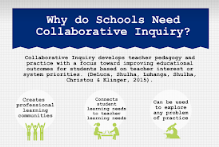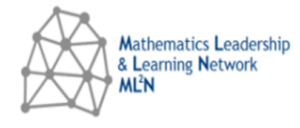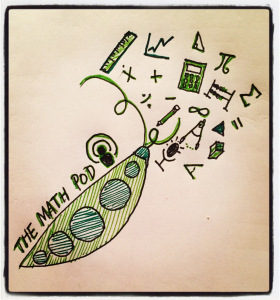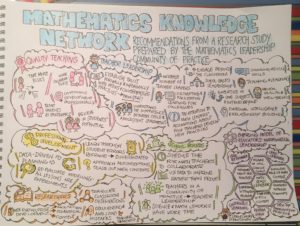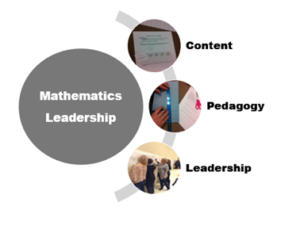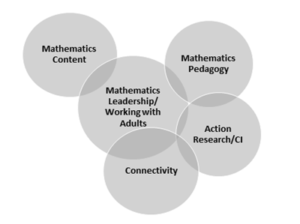NEWS
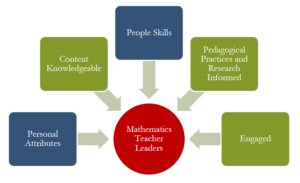
GECDSB’s Mathematics Leadership Learning Project (MLLP) (August 2018). For the project overview, results, and implications for future learning, check out the report by our Mathematics Leadership CoP & GECDSB.
The Math Pod Cycle 3 Overview (May 2018). Cycle 3 of The Math Pod occurred from April 4-25, 2018. During these 4 weeks of professional learning with Dr. Cathy Fosnot, participants moved from arithmetic to algebra. Check out the highlights from Cycle 3 in this report by our Mathematics Leadership CoP!
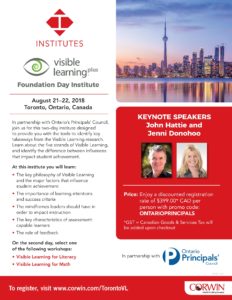
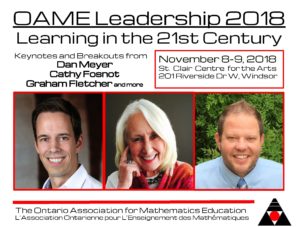
The Math Pod Cycle 2 Overview (April 2018). Cycle 2 of The Math Pod occurred from January 17 – February 7, 2018. Check out the highlights from Cycle 2 in this report by our Mathematics Leadership Community of Practice!
The Math Pod Cycle 3 – Arithmetic to Algebra: Looking for the Powerful Moments, K-8 (April 4, 11, 18, & 25, 2018). Cathy Fosnot will be opening up her online platform, P2S2, for the month of April and will be running an online Professional Learning Community (PLC) to accompany the weekly radio show on VoicEd Radio. Learn more and register here!
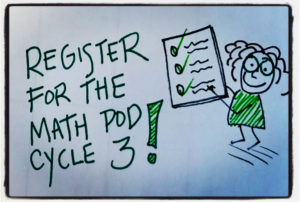
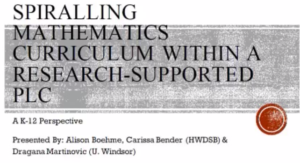
The Math Pod (@TheMathPod)
The Math Pod is a collaborative open learning opportunity for all educators lead by three Ontario math leadership networks, the MLN, ML2N, and NWML2N. Join them for twitter chats, podcasts, and more in their second phase January 17 – February 7 2018. In the meantime, check out their overview of phase 1 in this report.
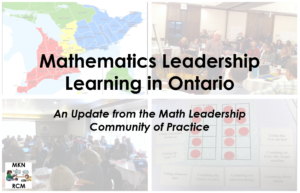
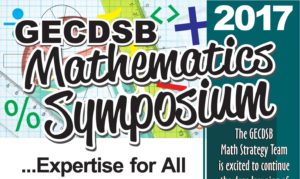
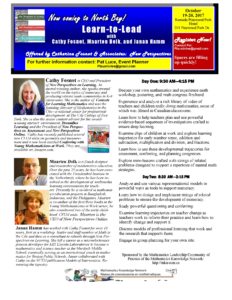
The Mathematics Leadership CoP has been busy! See their latest updates here.
MATHEMATICS LEADERSHIP
A major emphasis and requirement of the Ministry of Education’s mathematics goals and priorities is the development of school-based math leaders. These “math teacher leads” are identified in their school and may or may not have a formal mathematical background. Some of these teacher leads may have taken up the opportunity provided by the Ministry of Education to take additional qualifications in mathematics. While these courses provide opportunities to enhance practice, they do not fully address the ways in which to then take this knowledge and mobilize it in ways to enhance practices throughout a school. These new math lead teachers are also simultaneously a new leadership role/partner for school administrators. The ways in which this relationship is negotiated to support the advancement of mathematics education and student achievement is in its infancy. The aim of this CoP is to develop powerful models for supporting school-based mathematics leaders to support teachers to advance their mathematics teaching practice and mathematical content knowledge which should ultimately enhance student achievement. This CoP will take a cross-panel perspective and include secondary and elementary school-based mathematics leaders.
OVERVIEW
Teacher leaders are first and foremost effective teachers; they are able to demonstrate on a daily basis the competencies associated with effective classroom instruction. This is how Joseph Rogus (1988) describes effective teachers:
“effective classroom teachers are reflective practitioners who know the research and the literature on teaching; they model the best practice in instruction; they are well grounded in their discipline(s) and are liberally educated; they place their classrooms in a larger social context and understand alternative visions of school and how external political and cultural factors influence these variables; they demonstrate command of program regularities; and they have internalized the wisdoms of daily practice.” (p. 48).
Researchers, such as Ruhama Even (1999) emphasize the complexity of teacher leadership by stating that for successfully helping “others develop their teaching” it is not enough that one is recognized as an experienced and excellent teacher. These individuals need to have solid:
- Content knowledge and pedagogical content knowledge in conjunction with current views of mathematics teaching and learning (e.g., cognitive, curricular, technological, and social aspects of teaching different mathematical topics, assessment of diverse student population);
- Leadership and mentoring knowledge and skills for working with peers (i.e., adults; teachers);
- Connections within the education community.
Even suggests that additional component in teacher leader capacity is experience in conducting action research/collaborative inquiry (see Figure 1).
Figure 1. An emerging model of mathematics teacher leadership.
ABOUT MATHEMATICS LEADERSHIP COMMUNITY OF PRACTICE
The Mathematics Leadership CoP is aligned with the Renewed Math Strategy (RMS, 2016) which highlights importance of increased professional learning opportunities for teachers and principals as instructional leaders. The RMS requires that each elementary school has at least one math lead teacher to support mathematics teaching and learning in their school. Such new content leadership role requires that these math lead teachers work closely with their peers and school administrators. While researchers must still characterize “the mathematical knowledge and skills that leaders require” (Borko, Koellner, & Jacobs, 2014, p. 150), the aim of the ML CoP is to develop practice-informed models for supporting school-based mathematics leaders in their role. This CoP will also mobilize other leaders in the Province, including those who are school-board-based and faculty of education-based, with the idea that working collectively, we can provide adequate support to teachers, thus reaching every classroom and every child. Co-leading this CoP are Dr. Dragana Martinovic (University of Windsor) and the Greater Essex County DSB.
To achieve its goals, the ML CoP will work with partners across the Province to identify and create evidence-based models for enhancing mathematics teaching and learning. The partners include faculties of education, school boards, leadership networks, teacher informal groups, professional organizations, and individuals. This will allow for both vertical and lateral system’s learning; vertical, through case studies of particular schools, boards, and networks; and lateral, that includes exchange of knowledge and learning between educators in the Province.
In many ways our work is related to better understanding and redefining teaching profession. As Fullan emphasized, if we “are going to get breakthrough results innovation must come from teachers working in collaboration” (p. 7). So, our CoP is envisioned as an interactive system which connects networks, organizations and individuals, to support development of both human capital (e.g., through formal education—teacher education and AQ courses and on-the-job experience) and social capital (e.g., frequency of teacher conversations about mathematics instruction—content and pedagogy, trust and closeness between peers).
MEMBERS
Co-Leads: Dragana Martinovic (University of Windsor) and Clara Howitt (GECDSB).
Members: Jodie Williams (Chair FNMIEAO); Heidi Horn-Olivito (GECDSB); Sharon Johnson (GECDSB); Cam Fraser (OPC); Luciana Cardarelli (CPCO); Judy Mendaglio (OAME); Elizabeth Pearsall (SWOAME); Cathy Chaput (OMCA); Irene McEvoy (OMCA); Diane Boyer (AFEMO); Serge Demers (Laurentian University); Tim Graves (MLN); Maria Ivankovic (MLNTO); Jacqueline Herman (MLNTO); Andrea Gillespie (ML2N); Sandra Peirce (ML2N); Nancy Petrick (NWML2N); Alex Lawson (Lakehead University); Anna Jupp (York University); Tina Rapke (York University); Alison Boehme (HWDSB).
IMPLEMENTATION PLAN
Our work for 2017 involves building partnerships and mobilizing knowledge gained through different initiatives in the Province. We will simultaneously organize and/or follow both “ground-up” (those that directly involve teachers and schools) and “top-down” initiatives (those that involve school board and school administrators), to better understand the needs of educators in different roles regarding the RMS.
GECDSB (contacts, Heidi Horn-Olivito and Sharon Johnson)
In the spring of 2016 the GECDSB released a report by its Math Task Force. One of the areas examined in this report was that of mathematics leader and mathematics leadership. In the first year of implementation of the recommendations from the report the GECDSB focused on building mathematics content, pedagogy and leadership capacity of lead-learners. These lead-learners were identified as formal leaders (central office and administration) and school-based mathematics learning teams.
There were a variety of capacity building sessions, workshops, book talks, and school-based learning opportunities provided for lead-learners to enhance their practice as leaders of mathematics education. The GECDSB has learned a great deal about mathematics leadership and continues to investigate processes and structures that support mathematics leaders. The data gathered from the work this year suggest that greater attention must be given to organizational structures that support mathematics leaders. As well, greater depth of learning is required in the area of mathematics content, pedagogy and leadership.
See their Math Task Force’s learning briefs here:
- The Basics about Back to Math Basics
- Rote vs. Discovery: Moving the Discussion Forward
- Expertise for All
- Supporting All Mathematics Learners through Responsive Learning Environments.
GECDSB and UWindsor (contacts, Dragana Martinovic, Heidi Horn-Olivito and Sharon Johnson)
The GECDSB has sustained a partnership with the University of Windsor through a collaborative inquiry project that has spanned seven years. The strength of the partnership has allowed for unique opportunities for teachers to engage in inquiry and build their professional capacity. The principles of the GECDSB-University of Windsor Collaborative Inquiry project are woven through the current work of building capacity of mathematics lead-learners.
MLN (contact, Tim Graves)
Northeastern Ontario Mathematics Leadership Network consists of 48 members that include the Ministry Field Team, 8 Board Teams (up to 5 system leaders), 3 School Authorities, and 6 Critical Friends (Researchers). It will contribute evidence of impact of AQ learning on system leadership teams responsible for implementing RMS; evidence of increase in collective leadership efficacy; 8 Leadership Inquiries – specific to improving student achievement outcomes in mathematics at a systemic level; introduction of new ‘structures’ that can support wide-scale learning opportunities for educators; and share thinking about building the capacity of all Numeracy Facilitators in the region.
Twitter: #MathLeadersNEO
MLNTO (contacts, Maria Ivankovic and Jacqueline Herman)
The Mathematics Leadership Network – Toronto Region includes school boards across the Toronto Region, and is the newest Math Leadership Network. More details coming soon.
Twitter: @MLNTORegion, #MLNTO
ML2N (contacts, Andrea Gillespie and Sandra Peirce)
The Barrie Region Mathematics Leadership Learning Network consists of mathematics leadership teams from 11 District School Boards and 1 School Authority. The goals of this network are to develop mathematical content, pedagogical and leadership knowledge of a core group of school and district leaders while developing both the individual and collective mathematics leadership efficacy through a focus on: (a) knowing what strong mathematics instruction looks like; (b) encouraging strong instruction when it is not evident; (c) developing leadership content and pedagogical knowledge; (d) creating a culture of learning; and, (e) facilitating effective collaborative learning. The ML2N will help participating leaders to actively engage in, model, and champion knowledge mobilization practices, including finding, evaluating, using, and sharing high quality evidence, creating opportunities for knowledge exchange and co-learning, and encouraging and supporting others in applying these practices.
Twitter: @ML2Network, #ML2N
NWML2N (contact, Nancy Petrick)
The Northwest Region Mathematics Leadership and Learning Network (NWML2N) is comprised of leadership teams from 6 District School Boards and 2 School Authorities. The goals of the NWML2N are to (1) Support teachers and administrators (principals, vice-principals, superintendents) to develop capacity as lead learners in math and develop proficiency in math content knowledge for leading and learning; (2) Provide consistency to align goals identified in regional Board Improvement Plans for Student Achievement and Well-Being (BIPSA); (3) Build capacity within (and between) board teams to develop teacher efficacy, increase capacity, and strengthen math knowledge and leadership; and (4) Provide AQ opportunities for teachers, program staff, school administrators, and superintendents.
OPC (contact, Cam Fraser) and CPCO (contact, Luciana Cardarelli)
Ontario Principals’ Council and Catholic Principals’ Council of Ontario have thousands of members who may be pooled to learn about the challenges and successes of different implementation models.
OMCA (contact, Irene McEvoy)
The Ontario Mathematics Coordinators’ Association comprises of math education leaders from 27 different school districts in Ontario. The OMCA runs monthly meetings f2f and virtually, as well as conferences and retreats, which will directly inform our CoP about the professional development offered to math leaders.
HWDSB collaborative inquiry team (contact, Alison Boehme)
This math CI team consists of six K-12 math teachers across HWDSB to determine how evidence-based practice can be put into action when teachers start developing and applying a spiralled curriculum. This project explicitly approaches professional learning using an adult model without being encumbered by narrow initiatives allowing participants to embark on a journey of learning that is self-directed, collaborative, research based and reflective.
Learn more about their work in this 2-page summary!
SWOAME (contact, Elizabeth Pearsall)
A chapter of OAME, experienced in organizing local and province-wide events for math educators; has good connections with local school boards, a college and a university; has resources on the members’ website that could be utilized province wide; has members in the executive who are seasoned educators and math consultants. SWOAME will pilot different surveys which could be offered to the OAME members, and develop/disseminate resources for mathematics educators.
AFEMO (contact, Diane Boyer)
Association of francophone mathematics educators of Ontario will translate documents to disseminate through their newsletter and a website.
FNMIEAO (contact, Chair)
A provincial association representing First Nations, Métis and Inuit Studies and Indigenous language teachers will help us address the supports lead teachers need with respect to mathematics education of First Nations, Métis and Inuit students.
For more details, see the Mathematics Leadership Implementation Plan Document.
OUTCOMES & ACTIVITIES
- GECDSB had another Math Task Force meeting and is presently organizing professional development and data collection from 240 math leads.
- MLN had just completed the first year of their activities and started a new cycle with a three-day meeting in Sudbury.
- ML2N is having their first two-day meeting in May in Barrie.
RELATED PROJECTS AND RESOURCES
In the final report from the 2013/14 study conducted for the Ontario Principals’ Council, Pollock, Wang and Hauseman point to the changing nature of principals’ work. The principals of elementary and secondary schools in Ontario (N = 1,423, 52.68% of all principals) reported being overworked to the point of neglecting their own health and well-being (only 2% of them reported balancing life with work), and lacking time for professional development. Most of them wished to spend less time on management responsibilities (e.g., dealing with student discipline and attendance, and internal school issues), and more time on instructional leadership (e.g., curriculum, instruction, delivery, programming, assessment, and evaluation). Nearly 82% of them agreed that, “I have been too busy dealing with managerial tasks to give instructional issues the attention they deserve” (p. 29). Principals wished for “More time for professional development so that we can share that with staff” (p. 32-33). The project team suggests that principals “should specifically seek out [leadership skill set] training around four key areas: emotional intelligence/relationship-building; communication skills, knowledge of teaching and learning; and mental health and wellness” (p. 37). The whole report is available here.
The School Board-University Research Exchange (SURE) network has developed five videos in the “Research to Practice” video series. These short videos are intended to assist – as well as inspire – teachers to become researchers. The series consists of the following titles: Teacher Research: Forms and Possibilities, Thinking Like a Researcher, Ethical Teachers, Ethical Researchers, Models of Collaboration, and Research Reports: Easy Access, Efficient Utilization. The videos can be used during research seminars, staff meetings, and professional development days.
Contact: Arielle Figov (MKN Coordinator, afigov@fields.utoronto.ca)
References
Borko, H., Koellner, K., & Jacobs, J. (2014). Examining novice teacher leaders’ facilitation of mathematics professional development. Journal of Mathematical Behavior, 33, 149-167.
Fullan, M. (2011). Learning is the work. Retrieved from michaelfullan.ca/wp-content/uploads/2016/06/13396087260.pdf
Rogus, J. F. (1988). Teacher leader programming: Theoretical underpinnings. Journal of Teacher Education, 39(1), 46-52.



